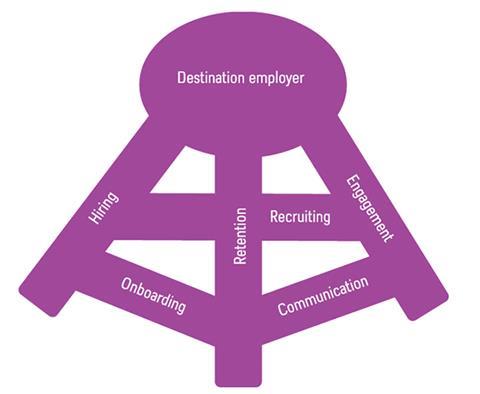
If you read nothing else, read this …
- The ability to attract, retain and hire talented employees helps create a destination employer.
- Reward packages play a role in all three stages.
- Reward and benefits strategies must be engaged at an early stage of an employee’s lifecycle, such as onboarding, to help motivate staff.
It is the perception of an organisation by both current and future employees that is perhaps one of the most overlooked measurements of success in the business world. The way in which an organisation attracts, recruits and retains talented employees is one of the most critical components. Organisations that have made this a core focus are known as destination employers.
Patricia Hind, director of Ashridge Business School’s Centre for Research in Executive Education, says: “Successful organisations understand that employing and engaging the best people available gives them a significant competitive advantage through increased productivity, and is therefore a key route to revenue growth.
“The way to becoming a destination employer involves processes being in place around the ‘three-legged stool’ of hiring, retention and engagement. The role played by reward packages at each of these three stages is critical.”
Engagement from the outset
There is also a further process that should be taken into account to be considered a destination employer: the way in which new starters are treated can have a big influence on their tenure at an organisation. Employers need to focus on the onboarding of employees because, without it, new staff could quickly become disgruntled and disengaged. Michael Bourne, professor of business performance at Cranfield University’s School of Management, says: “Reward comes in here when employers might want to establish a motivation strategy quickly, by introducing an internal mentoring programme that can help train and develop employees, with reward and recognition given to new employees for good performance. It can help encourage certain types of people.”
Motivating new employees will help build engagement with an employer. Jamie Mackenzie, marketing director at Sodexo Benefits and Reward Services, adds: “If an employer regards itself as a destination employer, then creating engagement in benefits at the start of the hiring process will pay dividends. Reward and recognition schemes with true flexibility in the workplace help motivate people to do a better job, [and] it helps bring an organisation to life.”
Relevant reward proposition
Destination employers must offer relevant reward and benefits that demonstrate a deep understanding of what individuals really want. Not only is job satisfaction a fundamental requirement, but the potential to grow and develop a meaningful career is also a prerequisite if talent turnover is to be avoided. A solid benefits package that includes, for example, a flexible benefits scheme that provides true flexibility to entice employees to pick and choose the benefits they want can help to boost career satisfaction, productivity and retention of staff.
UKTV (see case study) is one example of an employer that has created a strategy that rewards employees for being creative and offers new employees learning and development opportunities to grow quickly inside the organisation.
According to research by recruitment firm Robert Walters, published in May 2015, 91% of millennial professionals say that the potential for rapid career progression is a top priority when choosing a destination employer. Ian Hodson, reward and benefits manager at the University of Lincoln, believes that learning and development is not just linked to the generation entering the workforce for the first time, but employers need to be much more aware of the increase in priority of development at other points of the employee lifecycle.
Charles Fair, head of consultancy at Great Place to Work, says: “A strong employer brand has a strong employee value proposition , which is not just all about reward and benefits but reward in the broad sense. It can build in the motivation strategy [and] the workplace itself, but also the learning and development opportunities. Millennials are looking for these things; they want to grow into a role.”
Reward strategy must work in tandem with business goals
For the reward strategy to be successful in creating a destination employer, it must align with an organisation’s overall HR strategy and business objectives, while incorporating key brand messages.
Employer branding is essentially the application of techniques learnt from traditional marketing, which are then applied to people management. It can add significant value to an employer’s overall business proposition through the recruitment and retention of the best talent in the market.
Michael Rose, partner at Rewards Consulting, says: “The employer brand question has been around for years and it has two different shapes: external and internal. Many organisations might appear to have a positive external brand but these organisations tend to have a poor internal brand for employees, with not enough investment in effective management or benefits.
“More employers are recognising that the external brand and internal brand should be aligned. Reward is a critical element to this and there is a need to make sure systems deliver the business values.”
An example of this practice can be seen at McDonald’s Restaurants , which aligns everything it does with its business values but also has a strong focus on the training and development of its people.
Diversity plays a key role
Diversity is another key aspect for destination employers to factor in, and one that is continually changing. The Times ’ Top 50 Employers for Women annual recognition awards has seen a number of organisations make progress in increasing representation of women by using different approaches.
More employers continue to make commitments to publish pay audits to help close the gender pay gap, while others have focused on increasing the availability of agile working to all staff and ensuring working parents can return to successful and fulfilling careers.
Marcus Hayes, co-founder and joint managing director of change consultancy The Storytellers, says: “An organisation that is diverse will appeal to [an employee’s] own sense of values; it is all part of the underlying motivations for why people would want to work at that organisation.”
Winning external awards can really highlight to new recruits that what the organisation is doing is right for the business and increase the probability of becoming recognised as a destination employer.
“People look at organisations differently now than they did some years ago,” says Rose. “External awards can show that an employer is developing a good place to work and if it can show to people it gives good opportunities to all; it can be very attractive.”
Fair adds: “Employers need to take these awards seriously. Getting accreditation for what they have done does help attract people but it needs to be done for the right reasons. It has to be genuine and a reflection of their culture.”
Benefits communication
To ensure talent retention figures remain high for a destination employer, there must be an integrated system of communication about the benefits available and their actual delivery.
Ashridge’s Hind says: “Line managers and HR professionals need to work together to communicate well, to ensure that what is offered is understood and accessible, to deliver on promises, and most importantly to track engagement continuously to guarantee that the accolade of being a destination employer continues to be deserved.”
The concept of being a destination employer can be incredibly challenging to implement. For employers, being perceived as the top employer of choice in the market is entirely dependent on the ability of the entire organisation to implement and participate in each of the critical components.
Mackenzie says: “It involves everyone and every aspect of reward, from hourly paid or seasonal employees, up to the CEO [chief executive officer]; everyone affects the ability to become a true destination employer.”
‘Three-legged stool’ concept

Case study: UKTV builds strategy to create ideas culture to attract employees

UKTV has created an ideas culture within the business, which helps it stand out from the crowd in a competitive industry.
The TV broadcaster builds on this strategy to become a destination employer for top talent . It operates a strong focus on reward and recognition with three schemes to incentivise people to be creative, including a peer nomination scheme, on-the-spot thank yous from manangers and an employee awards ceremony.
It also offers staff the chance to apply for up to £1,000 grants to take non-work, life-enhancing courses.
Darren Childs, chief executive officer at UKTV, says: “We offer great incentives for people to be creative. I believe the brilliant, talented people who got through the tough recruitment process should be rewarded for their curiosity and creativity, at every step of the way. We have great initiatives such as ‘on-the-spot thank you’, which offers rewards such as a duvet day when people go above and beyond; and The Learning Curve, which offers employees the chance to apply for some non-work-related, but life-enhancing, training.”
It also has a strong focus on listening to its people, promotes equal opportunities for new employees and has a communication strategy that takes a top-down approach, with Childs taking full responsibility.
It moved offices in 2014 and its new space was designed to be fun and collaborative, with breakout spaces and an outdoor terrace to inspire creativity and engage people.
Childs says: “I want staff to feel that UKTV has the perfect environment in which they can do their best work. Our environment is not stale and staid; it’s bright and buzzy. We’ve got the head of a 50ft parrot, a first-class train carriage and tables that go through walls.
“It is about creating an environment where there is constant stimulation, constant movement and the ability to create the kind of serendipitous encounter that can lead to a creative breakthrough.”
Case study: Capital One develops employee value proposition

Capital One has implemented schemes to help build employee engagement and has developed a culture to help the organisation become a destination employer.
Its vision of ‘making lives better’ underpins everything the employer does, having gone on a journey of rebuilding trust between the business, leadership, management and its employees.
Karen Bowes, vice-president of international HR and sustainability at Capital One, says: “It is hard to compete with employers with a big external brand to attract people but our employment brand is strong and is key to attracting the best talent.
“We have a number of things that stand out to create this environment, pulling on all the levers to be a great place to work and an environment that is a destination for new people.”
Capital One’s transformation focused staff towards four different principles: power of purpose, leadership being present, motivation and a sense of camaraderie and fun.
Its employee value proposition also focuses on benefits in the context of total reward . It promotes benefits such as private medical insurance, pensions and bikes for work, and also ensures that staff are given details about their working environment, development opportunities and health and wellbeing initiatives.
Bowes adds: “From day one, people have onboarding classes and learn about the history and values of the organisation; then it is about bleeding in the aspects of reward, letting employees tailor benefits to their needs.
“But leadership is key to being a destination employer; we have fantastic open and transparent leaders who are very accessible. There is a real sense of fun and camaraderie working here, and [being a destination employer] is about creating that type of environment.”
As a result, Capital One has been named the UK’s best large employer in the Great Place to Work Institute’s ‘Best Workplaces 2015’ awards for the third year running.
Karen Bowes will be speaking at Employee Benefits Live on 22 September.
Neil Morrison: A great place to work give employees room to grow

In my time in the retail sector, I saw too many destination employers come and go to believe that somehow being the biggest makes you the best.
Certainly when it comes to careers, every employee will have their own reason for wanting to change employers, to move on and experience something new.
It could be the location, the job opportunity, the pay and conditions or something completely personal. I don’t think any one employer can provide every employee with everything they need throughout their employment life.
At Penguin Random House, we’re trying to create the workplace that simply allows employees to do the best work of their lives. That means we need to think about their needs on multiple levels, their pay and reward, their learning and development, their wellbeing and their career progression.
We’re incredibly privileged to do the work that we do, connecting readers with the best thoughts, ideas and writing, but that doesn’t mean we can rely on that to be enough for employees.
Since we merged Penguin and Random House in 2013, we’ve had a great opportunity to look at our entire employee value proposition, bit by bit, and tackle the areas that have needed improvement.
So far that’s included building and developing a flexible benefits offering for all employees , looking at variable compensation and now fixed pay. We’ve relaunched and extended our learning academy, amplified our wellbeing and health programmes and improved transparency of career opportunities.
Whatever we do, however, some people will always choose to move on and, in many cases, that is absolutely the right thing for their development.
What I hope we’re starting to do is create a real benchmark for them, so that they look back fondly and compare us positively with their next employer. That way, when the time is right, they’re more likely to get in contact and see what opportunities there are to come back.
Neil Morrison is group HR director at Penguin Random House




























